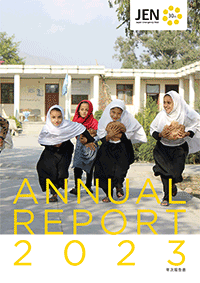Snow Storm Huda in Za’atari Camp(2)
When the sun came up the next day the water and 10-12 cm of heavy snow covered the ground. The trucks removed water as quickly as they could but the snow started melting faster than the trucks could work. More rain and snow fell. Other organizations brought in special trucks to clear out the septic tanks. Again the JEN team worked late into the night to stabilize the water levels.
The third day was also exceedingly long and cold. Another organization brought in additional trucks to support with de-watering. The JEN team persevered and by the time the left late at night they felt that they had made significant improvements – about 60% of the water had been removed and pumped outside the camp. That night temperatures dropped well below freezing. All the roads in the country were closed because they were covered in ice.
As the sun rose on the 4th morning the calls started again and our exhausted JEN team bundled up and went back out to keep working. Throughout the day the situation came more and more under control. We were able to reduce the number of trucks working and reduced the response to daylight hours. Nevertheless, it wasn’t until almost a week later that all water was removed and the normal routines in the camp could return to normal.
After all was said and done, Huda caused a lot more trouble in the north of Jordan than in Amman. People who had lived in the area their entire life said they had never seen anything like it. JEN’s emergency team rose to the challenge; braving extreme cold, and really wet conditions.
====For donation…↓↓↓↓↓↓====
○Postal transfer account No: 00170-2-538657
Account holder: JEN
○Credit card: http://bit.ly/c7R8iA
For any inquiries regarding bank transfers, please contact Tomita or Asakawa in JEN Tokyo Office at 03-5225-9352

![Jordan[Syrian refugees] Blog](/en/project/images/mainimg_project_jordan.jpg)





